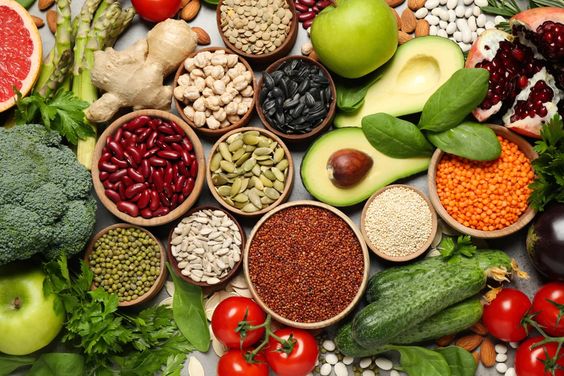Introduction:
We all know that a balanced diet is crucial for maintaining good health, but sometimes we overlook the importance of specific nutrients. Fiber, often dubbed "nature's broom," plays a pivotal role in our digestive health. Adequate fiber intake ensures smooth food transit through our digestive system, preventing discomfort and promoting regularity. But its benefits go beyond just digestion. High-fiber diets are linked to lower cholesterol levels, better blood sugar control, and even a reduced risk of certain cancers.

Despite these impressive advantages, many of us don't consume enough fiber daily. This is where understanding high-fiber foods comes in. By incorporating these foods into our meals, we can naturally boost our fiber intake and reap its numerous health benefits. This blog post delves into the world of high-fiber foods, exploring their benefits and providing practical tips for adding them to your diet.
Power Up Your Plate with These Fiber-Rich Foods:
From crunchy fruits and vegetables to hearty legumes and wholesome grains, a wide array of delicious foods can contribute to your daily fiber needs.
1. Fruits and Vegetables: Nature's fiber powerhouses! Berries like raspberries and strawberries are packed with fiber, while apples, bananas, and pears also contribute significantly. In the vegetable kingdom, broccoli, Brussels sprouts, carrots, and leafy greens like spinach and kale are excellent choices.
2. Legumes: Lentils, chickpeas, black beans, and kidney beans are not only rich in fiber but also excellent sources of plant-based protein. Add them to soups, stews, salads, or create delicious dips like hummus.
3. Whole Grains: Opt for whole-grain bread, brown rice, quinoa, and oats over their refined counterparts. These grains retain their bran layers, which are rich in fiber and other essential nutrients.
4. Nuts and Seeds: A handful of almonds, walnuts, chia seeds, or flaxseeds can provide a significant fiber boost along with healthy fats, protein, and essential vitamins and minerals.
Tips for Incorporating More Fiber into Your Diet:
1. Start Slowly: Don't drastically overhaul your diet overnight. Gradually increase your fiber intake to avoid digestive discomfort.
2. Hydrate Adequately: Fiber absorbs water, so make sure to drink plenty of fluids throughout the day.
3. Read Food Labels: Pay attention to the fiber content listed on food labels to make informed choices.
4. Get Creative in the Kitchen: Explore new recipes and experiment with different high-fiber ingredients.

.jpg)